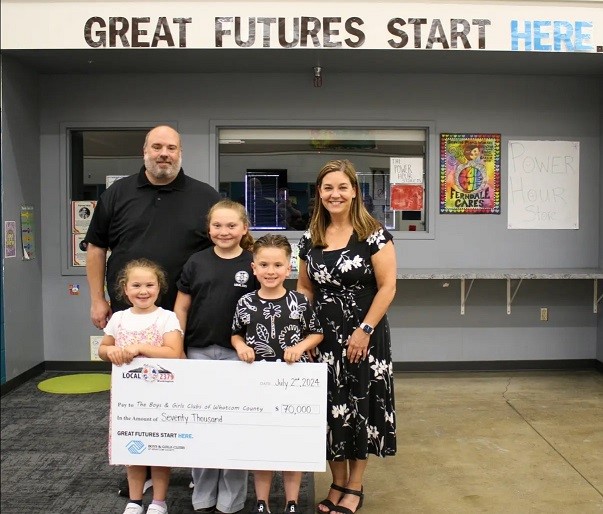The Intalco Aluminum Smelter in Ferndale, Wash., began operations in 1966 closing in 2020, and most of its employees were represented by IAM Local 2379, which negotiated a benefit plan to provide financial assistance to laid-off members. When the plant shut down in 2020, funds were distributed to eligible employees according to the plan’s rules. However, after all eligible funds were paid out, about $650,000 remained in the fund.
Members of IAM Local 2379 voted to donate the remaining money as follows:
- $130,000 each to three local colleges to establish scholarship funds in IAM Local 2379’s name, with a preference given to IAM members.
- $70,000 to the Whatcom Museum Foundation, which will establish an exhibit dedicated to the industrial area where the smelter was located. The museum collected many historical documents and items from the facility.
- $40,000 to the Boys & Girls Club of Whatcom County, which supported IAM members by offering before and after school programs for children while their parents worked 12-hour rotating shifts.
- $21,000 each to seven regional food banks in the community.
“The closure of Intalco marked the end of an era, but it also opened the door for us to give back to the community that supported IAM Members for so many years,” said IAM Western Territory General Vice President Gary R. Allen. “Through these donations, we’re not just honoring the past; we’re investing in the future, helping students, families, and neighbors when they need it most. It’s a reminder that even in tough times, solidarity and compassion can create lasting impact.”
“While the college scholarships may seem like the most significant donation, the contribution to the food banks came at a crucial time for the community,” said IAM District 160 Business Representative Luke Ackerson. “I spent two days meeting with the directors of each food bank and touring their facilities, and each shared a similar story, since 2020, the demand for food has tripled while donations have remained stagnant. The rising cost of food has pushed low-income families to the point where they must choose between housing and food. At many food banks, people arrive as early as four hours before opening to secure their place in line and ensure they receive something.”
One director talked about how she had just lost a grant for fresh produce the week before the check was delivered. Many directors emphasized the value of cash donations over food donations for two main reasons. First, they can purchase food at wholesale prices, allowing them to feed three people for the cost it would take an individual to feed one. Second, donated food requires inspection, sorting, and repackaging, which is labor-intensive. That time could be better spent delivering food to those who are disabled or unable to get to the food bank.
“I used this experience to teach my children by bringing them along to the food banks as we delivered the checks, even making donations of their own,” continued Ackerson. “It was a powerful experience for all of us, motivating us to take a more active role in addressing the crisis affecting our community. My children saw firsthand that anyone can fall on hard times, and we all learned the importance of empathy, compassion, and the difference we can make by putting others’ needs before our own. These real-world lessons align with the IAM’s core values of solidarity, community service, and advocacy for working families.”
The post IAM Local 2379 Gives Back To Washington State Community appeared first on IAMAW.

